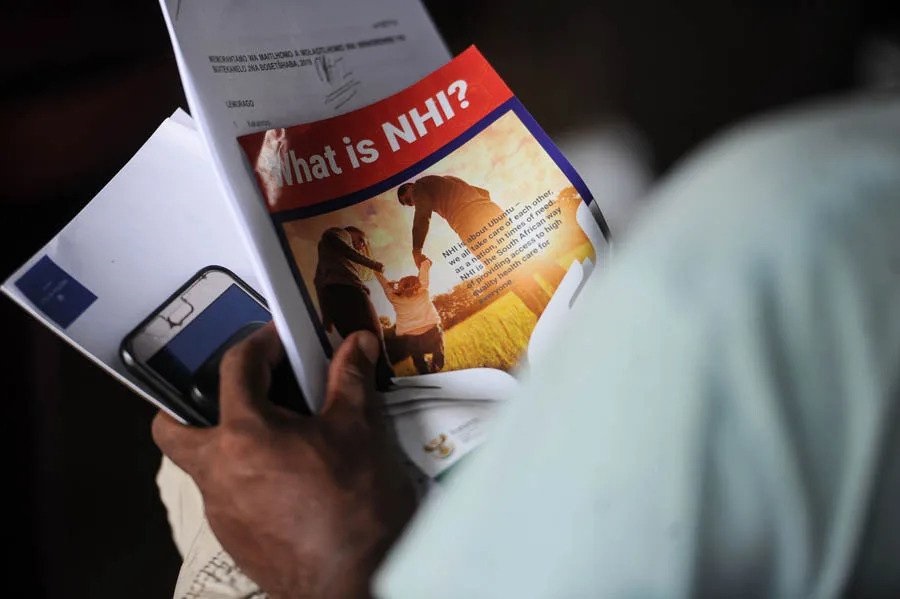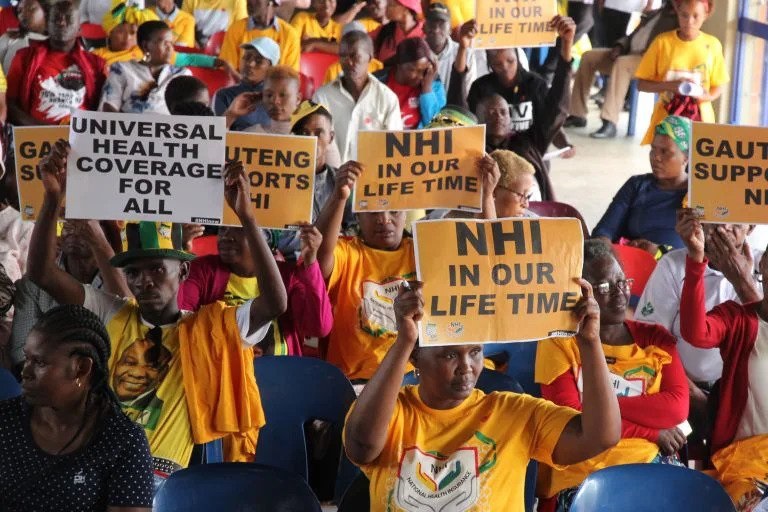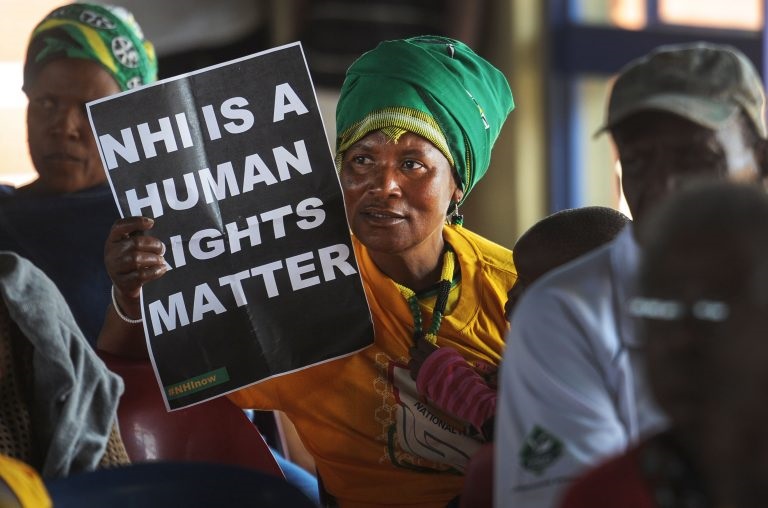
For all the suffering and death the Covid-19 pandemic has caused over the last 12 months, it has arguably also provided a unique opportunity to test some of the mechanisms behind South Africa’s proposed National Health Insurance (NHI) system.
The centralised procurement of vaccines and the contracting of doctors, for example, are probably not too dissimilar from the arrangements we might see under NHI.
What lessons then, if any, should we take from the Covid-19 response as we continue to debate the NHI Bill and how a NHI system might work? We put this question to three public health experts.
What Covid-19 revealed about health systems
The impact Covid-19 has had on NHI is an interesting question, but more relevant perhaps is asking what the pandemic has taught us about our healthcare system, argues Professor Alex van den Heever, chair in the field of Social Security Systems Administration and Management Studies at the Wits School of Governance.
Van den Heever says the pandemic has shown that the centralisation of power often creates what he calls a “single gatekeeper” for activities, such as distribution and procurement. “If you have all your eggs in one basket, and this is what we learned from the Covid-19 experience, is that if they mess up, they mess it up for everybody. That’s the problem with poor centralised designs – that you give too much power to a centralised structure, [and] if they fail, it fails for everybody,” he says.
Procurement corruption and NHI
Speaking on the corruption that was revealed by the Special Investigating Unit involving procurement of personal protective equipment (PPE), van den Heever says that this shows how pre-existing provincial public healthcare systems are deeply corrupt across the board, which is cause for concern given the centralised structure of NHI.
Adding to this, Sasha Stevenson, head of health at Section27, says that these PPE disasters highlighted the risks when procurement is not transparent and there is no accountability. “These were not new risks. In fact, the Auditor-General has been warning about poor financial and supply chain management and a lack of accountability in health for years,” she says.
Read: PPE corruption woes: Half of R30bn spent by Treasury is under investigation by SIU
These procurement issues, however bad, cannot solely be blamed on the health sector, says Nicholas Crisp, who has been working to establish the government’s NHI office.
“The procurement in the healthcare sector is not controlled by the department exclusively, this corruption is everywhere, all the departments. There are issues around the procurement policies and requirements which are laid down by the Treasury, not by the national department of health. We know, and Treasury knows, that it was a mistake to reduce the requirements for the procurement of PPE, because it opened doors that allowed this to happen.”
Crisp says that the plans for procurement under NHI are far better than the current or emergency procurement regulations.
Centralised procurement
For procurement under NHI to be effective, Stevenson says that strong governance systems must be established from the start and transparency must be guaranteed. This transparency must carry over to all transactions of the NHI fund, details relating to the benefit package, as well as details concerning procurement.
“Covid-19 highlighted, once again, the vast inequities in the health system. A health system that can only cater to some, will fail all. For NHI to work we need strong leadership and governance, we need transparency, and we need equity,” says Stevenson.
The NHI proposals as they stand, notes van den Heever, involve a lot of centralisation of procurement in a corporate governance framework that allows for political appointments all the way through.
“There are three areas that are high-risk areas vulnerable to corruption in public organisations. One is the power of appointment, the second is procurement and the third is licensing. All those three elements will actually fall under centralised control within the NHI framework with governing party control over the organisation. Remember, a political party is a private organisation and has no place directly running public entities,” he says.
“The only difference between what we have now and what is envisaged in the NHI, is that they’re proposing to consolidate that authority at a national level and then make it a purchaser of everything. So it’s a massive increase in the concentration of power,” he says.
With regard to weak provincial healthcare systems, Crisp says that Covid-19 has shown the need for cohesion between national and provincial health departments to be dramatically improved and that the national department must provide stronger leadership.
“In the public sector, giving money to the provinces and telling them to give health a little here and there and not having a succinct and coherent national budget is terrible,” he says.
Public and private sector cooperation
Despite the findings of widespread corruption, not everything that the pandemic has revealed in South Africa has been bad.
Stevenson says that the government’s centralised vaccine procurement and allocation plans could be a good opportunity to showcase the benefits of a functioning NHI.
“If implemented, these plans are a good opportunity to demonstrate the benefits, for public health, for cost and for equity, of a health system that treats people according to need rather than according to wealth,” she says.
“Similar opportunities presented during Covid-19, such as standardising testing cost or hospitalisation protocols across the public and private sectors, were not taken up. The vaccine programme is a chance to learn from the shortcomings of the “business as usual approach” to health service provision, and I hope that the department will stick to its guns,” she says.
Covid-19 was a wake-up call, says Crisp, which highlighted known deficiencies that suddenly became priorities. “We’ve proven we can fix A, B, C, D and E, we’ve proven that we can talk to the private sector. There’s a whole lot of stuff that is better than it was before Covid-19,” says Crisp.
Last year, Spotlight reported on negotiations between the public and private sector as a way to increase bed capacity during the peak of the pandemic. Looking back, only the Western Cape was successful with negotiating service level agreements (SLAs) between providers in both sectors.
Crisp says that these emergency negotiations highlighted once again the stark complexities of the private sector, but he emphasised that under NHI, services would be purchased very differently.
“We failed in getting [primary healthcare] providers (GPs, etc) into structured SLA arrangements and that was a sad lost opportunity. Hospitals are easy to contract but they employ only admin and nurses, so doctors and associated practitioners need to be contracted separately,” he says. Primary healthcare will also be simplified to a capitation model, rather than fee-for-service.
“[For NHI], we’re not really interested in if you’re a public or private provider. As long as your quality meets the requirements, and as long as your systems are inter-operable with the entire NHI system, and as long as you sign a contract so we know you’re not operating outside of the rules, I don’t mind if you’re a public or private provider,” says Crisp.
“What the NHI says, is the only thing that matters is the patient. You and I as a member of the public, we matter, and the day we get sick, whether or not we can pay for it, must not be relevant. The fact is we are sick and we need to get healthcare and it must be paid for. Therefore pre-finance it, put the money into a place where we can all access it and put an administration in place that pays the same for you or me for the same procedure irrespective of where we get it. That’s the NHI,” he says.
“I’m tired of the lectures that tell me you can’t do it and everything’s bad, and just let the private market decide. We need a fool-proof system that says the day I need healthcare, I can get it. That’s what the NHI is about.”
Improvements in data management
Another positive result of the pandemic, says Crisp, are the improvements made in data collection and sharing as well as systems management.
“There wasn’t a mechanism to automatically access the data or the lab results, it was extremely difficult to report on anything. The team that was working on it did a remarkable job, sometimes patch work capabilities but other times completely new capabilities, and they did it on the back of the NHI’s data systems that we were already putting in place. The cohesion of that data is dramatically better than it was a year ago,” he says.
NHI Bill to become law by 2022?
One of Spotlight’s top 12 questions for 2021 was whether the NHI Bill would become law before the end of the year and how the bill eventually sent to the president will differ from what is currently on the table. Based on budget documents released last week, it seems the answer to the first of these questions is “no”.
“I understand that Parliament is still to review all the written comments and that the plan is then to hear oral submissions. The Bill would then ordinarily be returned to the Department of Health for revisions before being passed, so we still have some way to go in the legislative process,” says Stevenson.
Covid-19 may delay the statutory consultations, says Crisp, and there are likely to still be challenges to parts of the bill. “Bills seldom pass unaltered, but if the changes are fundamental, they are returned and must start again. I personally don’t want to see any major changes, but I do see opportunities for improvements in content and language,” he says.
Van den Heever, however, has little hope for the bill. “This remains a political vanity project without any prospect of success,” he says. “The Bill and the policy objective are unattainable due to a deeply flawed institutional model and an unattainable set of fiscal assumptions.”
Note: Sasha Stevenson from Section27 is quoted in this article. Spotlight is published by Section27 and the Treatment Action Campaign, but is editorially independent – an independence that the editors guard jealously. Spotlight is a member of the South African Press Council.
*This article is published by Spotlight – health journalism in the public interest.
| ||||||||||||||||||||||||||||||
 |




 Publications
Publications
 Partners
Partners












